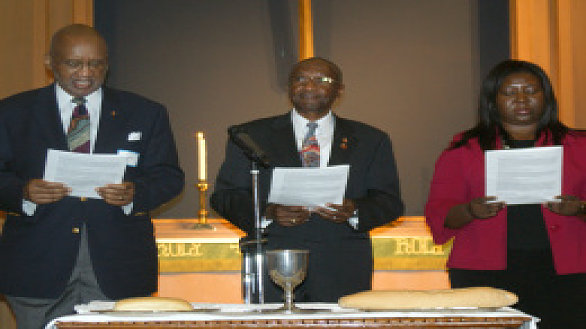Photo: UM Bishops Felton May (left) and Marcus Matthews (center) join with Erin Hawkins for worship during a gathering at Turning Point UMC in Trenton, N.J., for ethnic delegates to the 2012 General Conference. Hawkins is top staff executive of the General Commission on Religion and Race. A UMNS photo by Kevin W. Wortham.
TRENTON, N.J. –– Some of the ethnic minority delegates in Northeastern Jurisdiction say they are troubled by a proposal to restructure the church.
During a fall gathering, some of the General Conference delegates said consolidating power in a 15-member board would reduce the participation of racial and ethnic minorities.
“With this new structure, a small number of voices will guide the church, and it seems to me that many voices will be missing from the table,” said the Rev. Varlyna D. Wright, a district superintendent in the Greater New Jersey Conference.
“As a woman of color, it frightens me. I am not sure that the people who will be put in these positions are aware of the issues that impact people who might be different from them, or that they are sensitive to the voices of people who are not at the table,” said Wright.
“Equity should be as much of a value driving decision-making as economy, efficiency and effectiveness,” said Erin Hawkins, top staff executive of the General Commission on Religion and Race.
Plan defended
Illinois Area Bishop Gregory V. Palmer, convener of the eight-member Interim Operations Team that drafted the proposal, assured the delegates that new structure would not mark a retreat from the denomination’s commitment to diversity and inclusiveness.
“We actually think it increases the opportunity because it will build into the system a greater collaboration,” he said. “It is possible for a smaller group of people to represent the diversity we care about as United Methodists.”
According to the proposals, the 15 directors of the Center for Connectional Mission and Ministry would be accountable to a 45-member General Council for Strategy and Oversight. The council would meet annually to review and evaluate the work of the center.
Legislative proposals call for five members of that council to be named by racial ethnic caucuses, and not less than 30 percent of the 21 persons elected through the five U.S. jurisdictions must be members of racial/ethnic groups.


